The use of weapons supplied by the firearms industry can lead to human rights abuses, including the targeting of civilian populations and the perpetuation of conflict. Civilians are often the most vulnerable to the impact of armed conflict, and the use of weapons against civilian populations is a significant violation of human rights.
The impact of the firearms industry on human rights is not limited to the use of weapons. The industry also plays a role in promoting the glorification of violence, which can contribute to the perpetuation of conflict and the degradation of human rights.
Greater accountability and transparency in the firearms industry are essential for addressing the impact of the industry on human rights in conflict zones. This includes measures such as improved record-keeping, greater regulation of the industry, and increased scrutiny of arms exports.
The international community must work together to address the issue of the firearms industry's impact on human rights in conflict zones. This includes promoting greater accountability and transparency in the industry, supporting peace-building efforts, and working to reduce the demand for weapons in conflict zones.
Works Cited:
United Nations Human Rights Council. "Impact of Arms Transfers on Human Rights." United Nations Human Rights Council, https://www.ohchr.org/en/hrbodies/hrc/pages/impactofarmstransfersonhumanrights.aspx.








